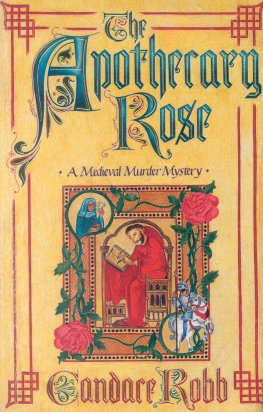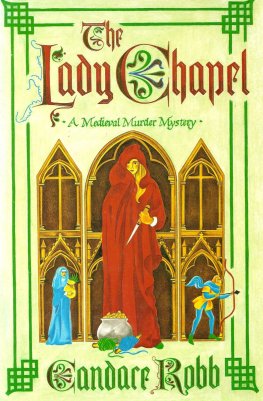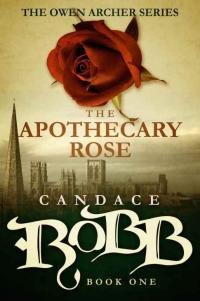Candace Robb - The Apothecary Rose
Here you can read online Candace Robb - The Apothecary Rose full text of the book (entire story) in english for free. Download pdf and epub, get meaning, cover and reviews about this ebook. year: 0101, genre: Detective and thriller. Description of the work, (preface) as well as reviews are available. Best literature library LitArk.com created for fans of good reading and offers a wide selection of genres:
Romance novel
Science fiction
Adventure
Detective
Science
History
Home and family
Prose
Art
Politics
Computer
Non-fiction
Religion
Business
Children
Humor
Choose a favorite category and find really read worthwhile books. Enjoy immersion in the world of imagination, feel the emotions of the characters or learn something new for yourself, make an fascinating discovery.
- Book:The Apothecary Rose
- Author:
- Genre:
- Year:0101
- Rating:5 / 5
- Favourites:Add to favourites
- Your mark:
- 100
- 1
- 2
- 3
- 4
- 5
The Apothecary Rose: summary, description and annotation
We offer to read an annotation, description, summary or preface (depends on what the author of the book "The Apothecary Rose" wrote himself). If you haven't found the necessary information about the book — write in the comments, we will try to find it.
The Apothecary Rose — read online for free the complete book (whole text) full work
Below is the text of the book, divided by pages. System saving the place of the last page read, allows you to conveniently read the book "The Apothecary Rose" online for free, without having to search again every time where you left off. Put a bookmark, and you can go to the page where you finished reading at any time.
Font size:
Interval:
Bookmark:
Candace Robb
The Apothecary Rose
Prologue
Brother Wulfstan checked the colour of his patient's eyes, tasted his sweat. The physick had only weakened the man. The Infirmarian feared he might lose this pilgrim. Trembling with disappointment, Wulfstan sat himself down at his worktable to think through the problem.
The pilgrim had arrived pale and hollow-cheeked at St. Mary's Abbey. Released from the Black Prince's service because of wounds and a bout with camp fever, the man had resolved to come on pilgrimage to York, his wounds making him more aware of his mortality than any sermon ever had. He'd endured a rough Chan shy;nel crossing and a long ride north that had reopened his wounds. Wulfstan had stopped the bleeding with periwinkle, but the recurrence of the fever caught him ill prepared. The Infirmarian had little experience with the ailments of soldiers, having lived in the cloistered peace of St. Mary's since childhood. He rarely ventured farther from the abbey than York Minster or Nicholas Wilton's apothecary, both within a short walk.
For two days and a night Wulfstan mixed physicks, applied plasters, and prayed. At last, exhausted and sick at heart, he thought of Nicholas Wilton. It was a sign of his hysteria that Wulfstan had not thought of the apothecary before Nicholas had worked a wondrous cure on a guest of the Archbishop who'd been near death with camp fever. He would know what to do. Wulfstan breathed three Aves in thanksgiving as his spirits soared. God had shown the way.
The Infirmarian instructed his novice, Henry, to keep the pilgrim's lips moist and to prepare a mint tisane for him to sip if he roused. Then Wulfstan hur shy;ried through the cloister to ask the Abbot's permission to go into the city. He brushed at the powder and bits of dried herbs on his habit. Abbot Campian was a fastidi shy;ous man. He believed that a tidy appearance bespoke a tidy mind. Wulfstan knew the Abbot could hardly dis shy;agree with his mission, but he found comfort in rules, as the Abbot did in tidiness. Wulfstan believed that if he obeyed and did his best, he could not fail to win a place, though humble, in the heavenly chorus. To be at peace in the arms of the Lord for all eternity. He could imagine no better fate. And rules showed him the way to that eternal contentment.
With his Abbot's permission, Wulfstan stepped out into the December afternoon. Bah. It had begun to snow. All through November and into December he'd awaited the first snow, and it came now, when he had an urgent errand. If he'd been a superstitious peasant, he would have suspected the fates were against him today. But he fortified himself with the conviction that as God had seen him through all the small troubles of his life, surely He could not mean to desert Wulfstan at this late date.
The Infirmarian pulled up his cowl and headed into the wind as fast as he could, blinking and puffing, out the Abbey gates and onto the cobbled street, into the bustle of York. The cacophony of the city startled Wulfstan out of his single-minded hurry. He became aware of a stitch in his side. His heart hammered. Such signs of frailty frightened him. He was behaving like a fool. He was too old to move so quickly, especially on cobbles made slippery with the first snow. Holding his side, he paused at the crossroads for a passing cart. The snow came down thick now, great, fluffy flakes that stung as they melted on his flushed cheeks. Overheat and then chill. You're an idiot, Wulfstan. He turned down Davygate, trying to moderate his speed. But Wilton's shop was just past the next crossing. He was so close to his goal. He picked up his pace again, propelled forward by fear of losing his patient.
Wulfstan had grown fond of the pilgrim in a short time. The man was a soft-spoken, gentle knight who identified himself only as a pilgrim wishing to pray, meditate, make his peace with God. He carried with him an old sorrow, the love of a woman who belonged to someone else. He spoke of her as the gentlest, most beautiful woman, whose purgatory on earth was to be tied to an old man who gave her no joy. 'What would she think of me now, eh, my friend?' His eyes would mist over. 'But she is gone.' The pilgrim came daily to the infirmary to have Wulfstan change his band shy;ages. During these visits he had discovered the herb garden, how its beauty comforted the heart, even in winter. 'She found solace in a garden much like this Many a day the pilgrim lingered there while Wulfstan puttered in the beds. He said little, observing the monastic rule of speaking only when necessary. He was ever ready to assist with carrying or fetching, sensitive to Wulfstan's old bones. Wulfstan enjoyed the man's quiet companionship and appreciated his help, though he knew accepting it was sinful indul shy;gence.
So he had taken it hard when the pilgrim collapsed in chapel. The man had been keeping a vigil that night in memory of his love. Brother Sebastian found him in a swoon on the cold stone floor at Lauds. Thanks be to God for the night office, or the pilgrim might have lain there till dawn and caught a mortal chill.
Even so, he was very ill. Wulfstan hurried. By the time he pushed open Wilton's shop door, the old monk was panting and bent double, clutching his side. The dimness of the shop and his own weakness blinded him momentarily; he could not see if anyone was in the shop. 'God's peace be with you,' he gasped. No answer. 'Nicholas? Lucie?'
The beaded curtain in the kitchen doorway rattled as someone stepped through. 'Brother Wulfstan!' Lucie Wilton lifted the hinged counter and took Wulfstan's hand. 'You look dreadful.' She smelled of the outdoors. 'Your hands are like ice.'
He straightened up with caution. 'You've been in the garden.' His breathless, shaky voice surprised him. He'd pushed himself even further than he'd thought.
'We wanted to cover the roses with straw before the snow.' Lucie Wilton held a spirit lamp up to his face. He blinked in the light. 'Come back by the kitchen fire. Your cheeks are aflame. You'll burst your heart hurrying so.'
Wulfstan followed her behind the counter and through to the kitchen, where he accepted a bench beside the fire with humble gratitude. Old age and shortness of breath made impossible the polite habit of protesting against kindness. In the cheery kitchen he smiled on Mistress Wilton, who brightened his heart with beauty, gentleness, courtesy. She would have made her father proud at court, he was certain. Sir Robert was an old fool.
She handed him a cup of warmed wine. 'Now what brings you out in the snow? And in such haste?' He told her the purpose of his errand. 'Camp fever. You are tending a soldier?' 'No longer a soldier. With his grey beard and sad eyes, I think those days are over for him.' Wulfstan glanced away from the kind concern in her face to the door that opened onto the garden. 'I hate to steal Nicholas from his roses. Do you perhaps know the proper mixture?'
'Nicholas has not yet tested me on it.' 'I hate to be a bother, but the man is so very ill.' Lucie patted him on the shoulder. 'Rest here while I fetch my husband.'
Lucie was apprenticed to her husband, a situation not unusual. Wives commonly learned their husbands' trades by working beside them. But Lucie's appren shy;ticeship had been formally arranged by Nicholas to ensure her future. Being sixteen years her senior, and of delicate health, he worried about her comfort after he passed on.
Another man might have looked on her fair face and reasoned that she would remarry. And in Lucie's case, perhaps marry better, closer to her original sta shy;tion in life. For Lucie was the daughter of Sir Robert D'Arby of Freythorpe Hadden, she might have married a minor lord. Had her mother not died when Lucie was young, it would almost certainly have been so. But with the death of the fair Amelie, Sir Robert had become singularly uninterested in his only child's lot in life. He'd sent her off to a convent, where Nicholas had discovered her and vowed to free her into a life more suited to her character. Wulfstan liked Nicholas Wilton for what he had done for Lucie. In the long run the apothecary would be a better inheritance than the settlement she might receive as a lord's widow, and it made her independent.
Font size:
Interval:
Bookmark:
Similar books «The Apothecary Rose»
Look at similar books to The Apothecary Rose. We have selected literature similar in name and meaning in the hope of providing readers with more options to find new, interesting, not yet read works.
Discussion, reviews of the book The Apothecary Rose and just readers' own opinions. Leave your comments, write what you think about the work, its meaning or the main characters. Specify what exactly you liked and what you didn't like, and why you think so.





